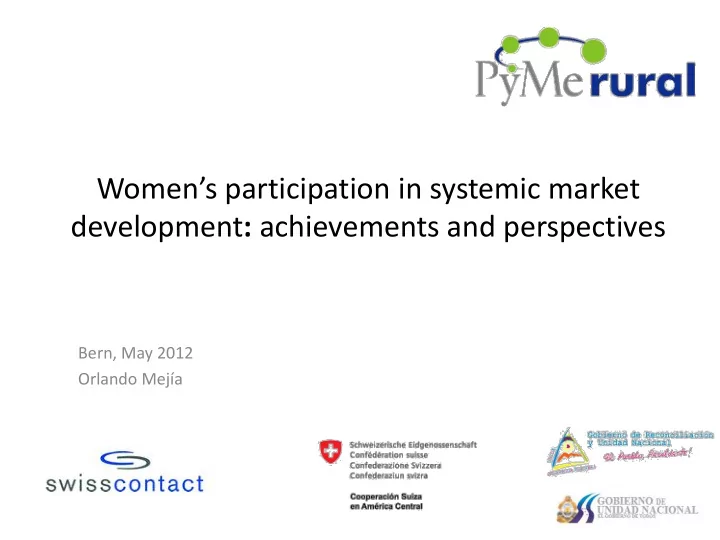

Women’s participation in systemic market development : achievements and perspectives Bern, May 2012 Orlando Mejía
Overview 1. Pymerural Program 2. How does Pymerural address economic empowerment of women? 3. Expected and unexpected results of the project in terms of women economic empowerment 4. Lessons learned and key challenges in promoting WEE
Pymerural: The Project Goal: E+I * women and men * rural areas * Honduras and Nicaragua Objective: SME sustainability in agro value chains & rural tourism Co-facilitator: Public and NGOs at local and national level Target group: Rural SMEs CHF: 13 Mio + 1.44 (Additional credit) + 1.5 Mio (IADB) + 0.8 Mio (EC) Total=16.74 Duration: 09.2008 -12.2012
Pymerural Program Impact Logic Positive impact on poverty reduction: Income + employment +vulnerability > ▼ Poverty Generate inclusive economic growth: Competitiveness of SMEs(Quantity, quality, productivity & access to market) Market System Change : Sustainable access to SMEs to services, inputs, etc. Public + private policies design + implementation Innovations Capacity building Local Economic Value Chain Development Development Value chains and territories that includes poor and women are identified
Pymerural: Sectors & territories 2009-2011 SMEs Value chains/subsectors Honduras Nicaragua 2009 % women 2011 % women Local Economic Development* Local Local 436 78% 1,191 53% 1,072 13% 4,485 14% Milk-Dairy Nationwide 20% 3,390 20% Horticulture Nationwide Local 3,000 Beekeeping Nationwide Nationwide 480 21% 3,591 21% Cocoa Nationwide 956 19% 1,300 20% Rural Tourism Local Local 209 31% Total 5,944 23% 14,172 21% *Local Economic Development : Danlí Rosquillas, Tamale, Tortillas, Bakery, Maize, Coffee, Brown Sugar, Clothing, Yalagüina Furniture, Bricks and Bamboo
Beekeepers Characteristics Characteristics M F 2011 Average age 44 48 Years of school 3 2 87 81 Li teracy (%) Average number 20 15 of beehives Access to water 78% 74% Single, widow or - 27% separa ted mo thers
WEE in Beekeeping Value Chain in Honduras: Strategy planning process Strategy with gender included in Beekeeping projects funded by Argidius, IADB and Pymerural 2004-2011 Beekeeping Sector Competitiveness Strategy (2005, 2009 and updated 2012) Workshops with VC representatives (men and women separated groups) to identify constraints and gender issues 2009-2011 Men and women VC committee representatives are identified and invited to include gender specific needs VC priority by Ministry of Agriculture, PRONAGRO 2005 and again 2009 VC selection based on poverty reduction, pro-poor growth, systemic change potential women participation Project staff internal gender training Surveys disaggregated by gender, VC analysis (SDC – Regional supported) 2004 and annual follow ups)
WEE in Beekeeping Value Chain in Honduras: Interventions Three intervention areas were prioritized in the beekeeping strategy: • Leadership workshops for women • Gender training for Development of new husbands Technical assistance to services: suppliers beekeepers women goods and materials • Multimedia video oriented Clothing: overalls and testimonials, radio) for methodologies veils; beeswax sheet, awareness to women frames and tools issues • Scholarships for women leaders Development of new Technical capacity Women Leadership services managed by building for women Women
Pymerural Program WEE results in Beekeeping in Honduras Impact 2004- 2011: • Scale from 277 to 2,617 SMEs, participation of women SMEs (from 1% to 25% ) Poverty • Equivalent jobs from 83 to 944 (1% to 22% women) reduction • USD 4.3 million additional net income (20% women income) • Advocacy > Increased market • Increased productivity • Access to interconnected markets access opportunities to from 4 -12 kg / women beekeepers and opportunities to women Economic beehive employees growth • Cooperatives board represented • New suppliers of goods and • Good beekeeping by women and men materials: Clothing, beeswax practices adopted Systemic • National association represented frames and tools suppliers change by women and men Technical capacity building Development of new services managed Intervention Women leadership for women by Women area
Beeswax
Tools
Summary of Pymerural Program WEE results in VCs (beekeeping, cocoa, vegetables, rosquillas, traditional food prod and clothing) • Economic advancement – Increased income, jobs, wages – Reduced vulnerability of women-led SMEs • Access to opportunities new business – Post-harvest, packaging, processing, etc. – Interconnected markets – Trade fairs • Access to services – Credit, Input and equipment suppliers • Decision-making authority – Advocacy -board association and cooperatives representation – Main source of income in household
Pymerural Program: Lessons learned and key challenges in WEE • Women are overloaded - get up early and stay up late, awareness to modify male behavior is possible with activities that put in evidence the inequality of workloads; • Single mothers are more vulnerable to inequality - have to do the work of men; • When intervening in interconnected markets, opportunities for women are created (processing, beeswax, veils & clothing); • Interconnected market development is challenging, but it is possible with differentiated partial incentives to stimulate purchase of equipment and required infrastructure.
Pymerural Program: Lessons learned and key challenges in WEE • Participation of women in organizational boards is a first positive step, but board decisions still influenced by male interests; • It is possible to address gender equity in programs with M4P, however you need to build capacity and awareness in human resources, staff, project / co-facilitators in order to value the importance and nature WEE; • Co-facilitators and local business organizations are a suitable platforms for sustainable promotion of gender equality.
Thank you!
Recommend
More recommend